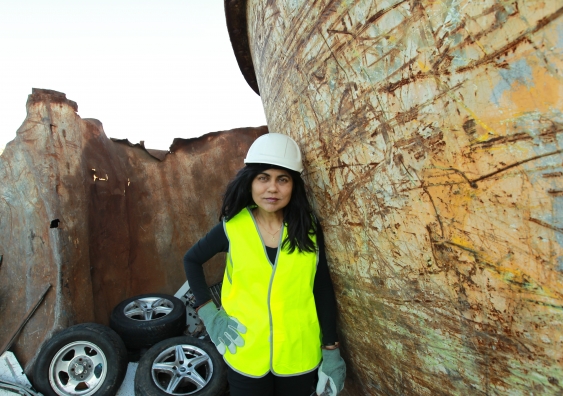Veena Sahajwalla first woman to be awarded India’s Jubilee Chair
UNSW’s internationally renowned waste innovator, Veena Sahajwalla, is the first woman to be awarded the prestigious Jubilee Professorship by the Indian Academy of Sciences.
UNSW’s internationally renowned waste innovator, Veena Sahajwalla, is the first woman to be awarded the prestigious Jubilee Professorship by the Indian Academy of Sciences.

UNSW’s internationally renowned waste innovator, Scientia Professor Veena Sahajwalla, is the first woman to be awarded the prestigious Jubilee Chair and Professorship by the Indian Academy of Sciences.
ARC Laureate Professor Sahajwalla and her team at the UNSW Centre for Sustainable Materials Research and Technology (SMaRT) are revolutionising recycling science to deliver practical and commercially viable solutions for many complex wastes otherwise destined for landfill. The Jubilee Chair is open to any scientist from any discipline worldwide and has most recently been held by leading academics from Harvard University and the University of Cambridge.
UNSW Deputy Vice-Chancellor Research Nicholas Fisk congratulated Scientia Professor Sahajwalla on the prestigious honour.
Green materials are cheaper, they reduce energy usage and emissions, they are non-toxic and they can be recycled at the end of their lives – and they look just as good and perform just as well as materials made of virgin raw materials.
"This is well-deserved recognition of Veena's many achievements. Veena is an internationally recognised research leader and trailblazer. She is a wonderful model for our students, particularly young women considering engineering or science as a career," Professor Fisk said.
The breakthrough science developed by Professor Sahajwalla and her team enables ‘green materials’ and products to be manufactured entirely, or largely, from the rubbish the world throws away, cleaning up waste stockpiles and reducing pressure on landfills and finite natural resources.
“Green materials are cheaper, they reduce energy usage and emissions, they are non-toxic and they can be recycled at the end of their lives – and they look just as good and perform just as well as materials made of virgin raw materials,” said Professor Sahajwalla, whose research was recently featured by BBC Future.
These include building products made from waste and a whole range of new innovative resources for the production of advanced materials, like carbon nanoparticles and metallic alloy and non-metallic particles. The waste streams being transformed at UNSW are among the world’s most challenging, including toxic electronic waste (e-waste) and the complex mixed waste left behind after a vehicle is scrapped and stripped of its useful metal.
“The Jubilee Chair and Professorship is a really great honour, these kinds of waste solutions are critical for building new, clean industries of the future,” said Professor Sahajwalla, who was born in Mumbai and studied in India before embarking on her international research career.
“India urgently needs a safe, low-cost recycling solution for e-waste. Our approach is to enable every local community to transform their waste into valuable metal alloys, instead of sending their old devices to landfill.”
Professor Sahajwalla also heads the UNSW-based ARC Green Manufacturing Hub that brings together researchers and industries to deliver new solutions to wastes, ranging from tyres, laminated glass, plastics to industrial and agricultural waste. In 2016, Professor Sahajwalla was named one of Australia’s most innovative engineers by Engineers Australia, the latest in a long list of Australian and international honours. She is best known as the inventor of ‘green steel’, a patented, commercialised steelmaking process that is transforming waste tyres in the production of steel at in Australia, and internationally.
Read more about Professor Sahajwalla's work in Research@UNSW's 15 Women Changing the World.